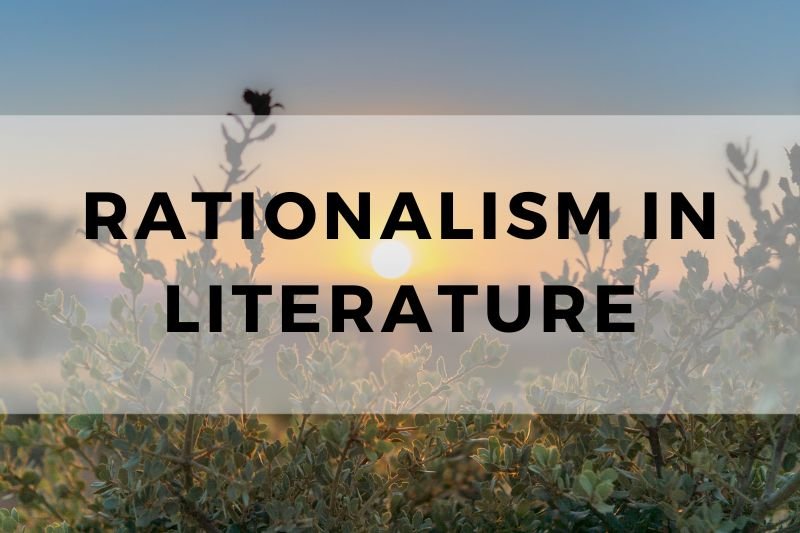
Can literature be guided by reason alone? Rationalism in literature argues that it can. This movement values logic, critical thinking, and empirical evidence. It rejects superstition and blind faith. Writers influenced by rationalism seek clarity and coherence. Their works challenge assumptions and demand intellectual rigor.
Rationalist literature emerged from the Enlightenment. It shaped philosophical discourse and scientific thought. Key figures like Descartes, Spinoza, and Kant infused their writings with reason. Their works laid the foundation for modern philosophy.
This article explores rationalism in literature, its defining traits, and its impact. It also compares rationalism with other literary movements.
Historical Background
Origins of Rationalism
Rationalism emerged during the 17th century as a response to religious dogma and scholasticism. Thinkers sought to replace faith-based reasoning with logic and empirical evidence. This shift was heavily influenced by the Scientific Revolution, which emphasized observation and systematic doubt. René Descartes, often called the “father of modern philosophy,” pioneered this approach with his method of radical doubt. His famous phrase, Cogito, ergo sum (“I think, therefore I am”), encapsulates rationalism’s emphasis on reason as the foundation of knowledge.
The Enlightenment further solidified rationalist principles in literature and philosophy. Writers moved away from divine explanations and embraced human intellect as the key to understanding reality. This shift not only influenced philosophy but also shaped literary styles, favoring clear argumentation and logical progression over emotional storytelling. Rationalism laid the groundwork for modern critical thinking and scientific inquiry.
Key Philosophers Influencing Literature
Several philosophers played a crucial role in integrating rationalist principles into literature. Their works did not merely theorize about reason but applied it rigorously to understanding existence, knowledge, and ethics.
- René Descartes (1596–1650) revolutionized philosophy with Discourse on Method and Meditations on First Philosophy, arguing that knowledge must be built on doubt and reason.
- Baruch Spinoza (1632–1677) took rationalism further with Ethics, presenting a deterministic universe governed by logical necessity. His rejection of supernatural explanations influenced secular literature.
- Isaac Newton (1643–1727), though primarily a scientist, shaped rationalist thought with Principia Mathematica, proving that natural laws could be understood through mathematical reasoning.
- David Hume (1711–1776), while sometimes classified as an empiricist, contributed significantly to rationalist discourse. His Treatise of Human Nature challenged assumptions about causation and human perception.
- Immanuel Kant (1724–1804) synthesized rationalism and empiricism in Critique of Pure Reason, redefining how reason structures human experience.
- Voltaire (1694–1778) used satire in Candide to expose the absurdity of blind faith and superstition, embodying rationalist critique in literature.
These philosophers transformed literature by making reason a central theme. Their works encouraged critical thinking and skepticism, shaping intellectual movements that extended beyond philosophy into politics, science, and the arts.
Characteristics of Rationalism in Literature
Emphasis on Reason and Logic
Rationalist literature prioritizes reason over emotion. Writers construct arguments using logic and structured reasoning. This approach ensures clarity, coherence, and intellectual depth. Unlike literature driven by sentiment, rationalist works favor analysis and structured debate. Philosophical texts, scientific treatises, and satirical critiques often reflect this style. Descartes’ Discourse on Method exemplifies this, as it systematically builds knowledge from fundamental principles.
Fiction influenced by rationalism also reflects this structured thinking. Voltaire’s Candide dissects optimism through rational critique rather than emotional appeal. Similarly, Enlightenment-era essays and plays use logical arguments to challenge religious and political institutions. Rationalist literature values precise reasoning, making ideas accessible and verifiable.
Focus on Empirical Evidence
Empirical evidence plays a vital role in rationalist literature. Writers demand proof and observable facts rather than relying on faith or tradition. This approach was strengthened by the Scientific Revolution, which emphasized experimentation and direct observation. Rationalist thinkers like Isaac Newton applied mathematical proofs to explain natural phenomena, influencing literature’s demand for intellectual rigor.
Philosophers such as David Hume pushed this idea further, arguing in A Treatise of Human Nature that all knowledge should be grounded in sensory experience. This empirical approach influenced historical and philosophical writing, encouraging authors to base arguments on verifiable facts rather than abstract speculation. The rationalist preference for evidence over assumption reshaped literary and philosophical traditions.
Rejection of Superstition and Dogma
Rationalist literature often critiques religious dogma and superstition. Writers challenge blind faith and advocate for knowledge derived from reason. The Enlightenment produced numerous texts that questioned religious authority, favoring secular explanations of morality and existence. Spinoza’s Ethics presents a pantheistic view of God, rejecting the idea of divine intervention. His arguments were so radical that they led to his excommunication from the Jewish community.
Satirical works also played a role in rationalist critique. Voltaire’s Candide mocks the notion of divine providence, exposing the flaws in blindly accepting religious teachings. This literary approach encouraged a more critical examination of tradition, promoting intellectual independence. Rationalist literature does not merely reject superstition; it demands a deeper engagement with truth through reasoned inquiry.
Examples of Rationalism in Literature: Major Works
#1. Discourse on Method (René Descartes)
Published in 1637, Discourse on Method laid the foundation for modern rationalist thought. Descartes argued that knowledge must begin with doubt and be built on self-evident truths. His famous declaration, Cogito, ergo sum (“I think, therefore I am”), established reason as the basis of certainty. The work rejects reliance on authority and tradition, advocating systematic inquiry instead.
Descartes’ method influenced both philosophy and literature. His insistence on clear reasoning shaped the Enlightenment’s intellectual climate. Rationalist writers adopted his structured approach, prioritizing logical argumentation over rhetorical flourish. His emphasis on individual reasoning also inspired later philosophical fiction.
#2. Meditations on First Philosophy (René Descartes)
Descartes expanded his rationalist framework in Meditations on First Philosophy (1641). He systematically questioned reality, doubting everything until reaching the undeniable certainty of self-awareness. Through six meditations, he attempted to prove God’s existence and the distinction between mind and body using pure reason.
This work had a profound impact on literature, influencing rationalist narratives that explore identity and perception. Writers adopted Descartes’ methodical reasoning to structure philosophical dialogues and essays. The book’s emphasis on logic over emotion reinforced rationalism’s role in shaping intellectual discourse in literature and beyond.
#3. Ethics (Baruch Spinoza)
Spinoza’s Ethics (1677) is a rationalist masterpiece that applies geometric reasoning to philosophy. Written in a systematic, axiomatic style, it presents a deterministic view of the universe, arguing that everything follows natural laws. Spinoza rejected the idea of a personal deity, instead defining God as identical with nature.
His work deeply influenced rationalist literature by promoting logic-driven inquiry. Ethics encouraged a secular perspective, inspiring later authors to challenge religious narratives with reasoned argumentation. Spinoza’s rationalist approach shaped the way literature engages with metaphysical and ethical questions.
#4. Principia Mathematica (Isaac Newton)
Published in 1687, Principia Mathematica revolutionized science and rationalist thought. Newton demonstrated that natural phenomena, from planetary motion to gravity, follow mathematical laws. His work reinforced the belief that the universe operates through logical principles rather than divine intervention.
Although primarily a scientific text, Principia Mathematica influenced literature by validating rationalist ideals. Enlightenment writers drew on Newton’s principles to construct narratives emphasizing reason, order, and empirical evidence. His success in explaining nature through mathematics reinforced literature’s shift toward realism and intellectual rigor.
#5. A Treatise of Human Nature (David Hume)
Hume’s A Treatise of Human Nature (1739) challenged traditional views on knowledge and causation. He argued that human understanding is based on experience, not innate reason. He criticized the assumption that cause-and-effect relationships are absolute, asserting that they are habits of perception rather than logical necessities.
This work shaped rationalist literature by emphasizing skepticism and empirical reasoning. Hume’s arguments influenced historical and philosophical narratives that questioned authority and tradition. His approach encouraged writers to explore the limits of human knowledge, shaping modern debates on reason and belief.
#6. Critique of Pure Reason (Immanuel Kant)
Kant’s Critique of Pure Reason (1781) synthesized rationalism and empiricism. He argued that while reason is essential, it must be grounded in experience. Kant introduced the concept of a priori knowledge—truths that exist independently of experience—while also recognizing the role of sensory perception.
This work reshaped rationalist literature by refining the debate on reason’s role in human understanding. Writers incorporated Kantian ideas to explore themes of knowledge, perception, and morality. His influence extended beyond philosophy, shaping literary movements that grappled with the tension between logic and experience.
#7. Candide (Voltaire)
Voltaire’s Candide (1759) is a satirical novel that critiques blind optimism and religious dogma. Through the protagonist’s misfortunes, Voltaire exposes the absurdity of believing that everything happens for the best. The novel employs rationalist arguments to dismantle superstitions and flawed philosophical doctrines, particularly those of Leibniz.
This novel represents rationalism’s impact on fiction. Voltaire uses wit and irony to challenge irrational beliefs, making complex philosophical arguments accessible to readers. Candide demonstrates how rationalist literature can engage audiences through narrative while promoting critical thinking.
Comparison with Other Literary Movements
Rationalism Vs. Romanticism in Literature
Rationalism and Romanticism represent opposing literary philosophies. Rationalism emphasizes reason, logic, and structured argumentation, while Romanticism prioritizes emotion, intuition, and individual experience. Rationalist literature, influenced by thinkers like Descartes and Spinoza, seeks objective truths through systematic reasoning. Romanticism, championed by writers like Wordsworth and Coleridge, values personal perception over universal principles.
Romantic literature often reacts against rationalism’s emphasis on intellectualism. While rationalist works aim for clarity and structured thought, Romantic texts embrace ambiguity and mystery. Rationalist writers rely on logical frameworks, while Romantics trust imagination. These contrasts shaped literary history, with Romanticism emerging as a reaction to the rationalist ideals of the Enlightenment.
Rationalism Vs. Realism in Literature
Rationalism and Realism share a commitment to truth but differ in approach. Rationalist literature builds knowledge through reason and structured logic. Realism, however, focuses on accurately portraying everyday life without embellishment. Rationalists like Kant and Descartes sought universal truths, while Realist authors like Flaubert and Tolstoy depicted human experience as it is, often highlighting its unpredictability.
Realism challenges the abstract nature of rationalist thought. While rationalism seeks certainty through deductive reasoning, Realism acknowledges life’s complexities and inconsistencies. Rationalist works aim to establish principles of thought, whereas Realist literature immerses readers in the nuances of human existence. Despite differences, both movements reject superstition, prioritizing truth over illusion.
Rationalism Vs. Modernism in Literature
Modernism and Rationalism differ in how they engage with knowledge and reality. Rationalist literature, rooted in Enlightenment ideals, trusts in human reason to uncover objective truths. Modernist works, influenced by thinkers like Nietzsche and Freud, question absolute truths and embrace subjectivity. Rationalism seeks logical consistency, while Modernism explores fragmented perspectives and uncertainty.
Modernist writers often critique rationalism’s rigid structures. They experiment with narrative forms, stream-of-consciousness techniques, and unreliable narrators to challenge the idea of a single, knowable reality. Rationalist literature presents structured arguments, while Modernism deconstructs them, reflecting the philosophical shift from certainty to skepticism in the 20th century.
Conclusion
Rationalism in literature has shaped intellectual and artistic traditions by prioritizing reason, logic, and empirical thought. It challenged superstition, promoted structured argumentation, and influenced major philosophical and literary works. Writers like Descartes, Spinoza, and Voltaire used literature to explore knowledge, ethics, and human nature through rational analysis.
While later movements like Romanticism, Realism, and Modernism reacted against or adapted rationalist ideals, its impact remains undeniable. Rationalist literature continues to inspire discussions on truth, skepticism, and intellectual inquiry. Its legacy endures in literature, philosophy, and science, proving the lasting relevance of reason in shaping human understanding.
